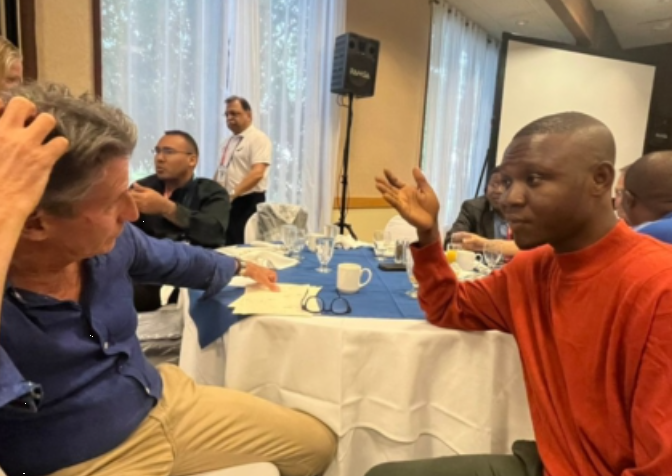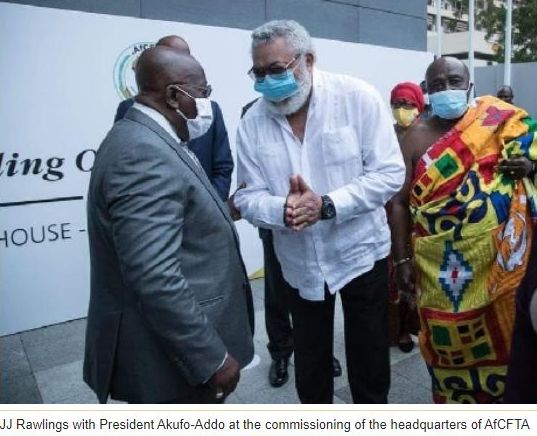Ghana’s athletics scene has potential, but you need to invest in top-notch instructors, says the president of World Athletics.
Ghana's athletics scene has potential, but you need to invest in top-notch instructors, says the president of World Athletics.
“Look,” says President of World Athletics, Sebastian Coe, leaning towards his left side with a smile. His white upper teeth were visible, his hair upright as if the wind was blowing “athletics in Ghana has huge potential,” he adds.
The grin disappeared, drawing seriousness. A couple of minutes earlier, he was on a podium with a lectern before him.
It was at the Columbia Conference room at Valley River Inn hotel, Oregon. He delivered almost an hour of speech to member associations during a breakfast meeting, enumerating how everyone has a role to play to make the sport better.
In that conversation, the presidents of hundreds of member associations heard the six-year plan for World Athletics laid out in straightforward terms.
He included “kids athletics” as one of them and described it as a “major” internal strategic project. However, he said that “it is not just about discovering talent routes so that we can locate those kids that do the famous playground to podium”
Beyond that, it states that “Athletics, I think, is best placed than any sport on the earth” to contribute to the welfare of communities, and World Athletics wishes to use its platform to advance society.
Coe has a forensic vision for the game. It was a fantastic practice, one that got right to the heart of the game.
However, it looks that Africa is left out of that picture. Every significant athletics governing body championship is held in one of Europe, America, Australia, or Asia.
A quick glance at the World Athletics contests and the schedule shows Budapest 2023 Championships to Tallahassee, Florida 2026, putting things into context.
He had many questions in mind. Seated at the left side of the lectern, about five tables away from where the most powerful man in world athletics delivered his message, he got up and walked to the far end where Coe had gone to sit after waiting for a while for questions and none came.
Standing on his left shoulder was Helen Delany, Director of International Relations and Development. On his right, there was an empty chair. I sat right across from him and said, ‘I have a couple of questions to ask, but I am going to be biased.’
Looking straight at me, he said, ‘give me a second.’ I didn’t have a second, I had seconds. It was a conversation I wanted to have.
With the exception of Africa, every Confederation’s president was present. Confederation of Africa Athletics (CAA) president Kalkaba Malboum and his secretary are not present in Oregon. His vice is also nonexistent.
I sought solutions. I was curious as to why Africa, specifically Nairobi, was not chosen to host the 2025 World Athletics Championships. I was interested in learning about his plans for the sport on the continent and, finally, his impressions of it in Ghana.
He invited Zambia Athletics President Elias Mpondela to join the conversation before he started.
Elias [Mpondela], come and participate in this discussion.
With the exception of Africa, every Confederation’s president was present. Confederation of Africa Athletics (CAA) president Kalkaba Malboum and his secretary are not present in Oregon. His vice is also nonexistent.
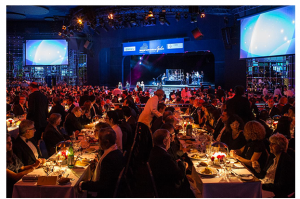
I turned around and invited Ghana Athletics’ Chief Executive Officer (CEO), Bawah Fuseini, to join us. I had to make sure Ghana heard about his expertise. That would have been a disgrace to this nation in West Africa.
He identified himself as Bawa Fuseini, CEO of Ghana Athletics, to President [Sebastian Coe].
He invited him to take a seat and enquired as to my role as president. That made me chuckle in my head. Even though I hadn’t even identified myself as a journalist, nothing would have changed.
It was the most direct off-the-record comment a world leader ever made to me. He offered a wide range of suggestions for how African athletics may be improved to make it competitive on the greatest stage.
“Africa is a continent with 54 countries, but only six or seven of them can compete and win medals. Numerous things must be changed. A conscious investment must be made in the sport, especially in coaching, he said.
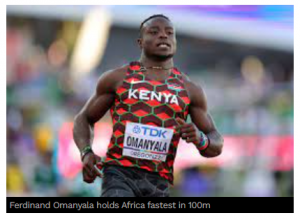
You and I were both born in Ghana, which is a region of the continent Coe wants to intentionally change. Athletes from this region of the world ought to be global champions with 54 nations.
There is Akani Simbine from South Africa who has remained close throughout their relationship. Ivory Coast native Arthur Cissé, Kenyan Ferdinand Omanyala, and Ghanaian native Benjamin Azamati.
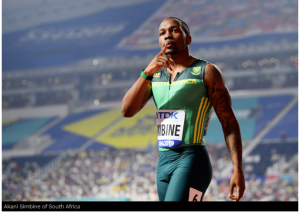
Azamati’s generation is a group of brilliant substance from a Ghanaian standpoint. a team that has the ability to stand on the podium, but something needs to change.
And what is that?
If you don’t have coaches of the highest caliber, he says. “Competing against countries that do is always going to be difficult,” he said before inviting three people to a meeting to discuss Ghana’s athletics. a gathering to examine the sport and identify any weaknesses.
He turned back the years when he competed on the track and won four Olympic medals, saying, “In the past.”
“You have a new generation of excellent athletes who have the potential to compete at the highest level. You have had some fantastic athletes.”
Coe is accurate. Azamati has experienced amazing things. There are times when, with better guidance, he could reach the podium, but he falters just when it counts.
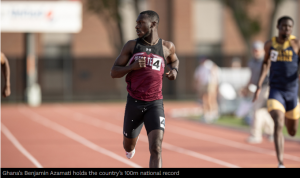
The country’s athlete coaches humiliated Bawah Fuseini, the CEO of Ghana Athletics, in 2021 for claiming that “we don’t have elite coaches in Ghana.”
Bawah and Sebastian concur. But lip service does not create “world-class coaches.”
Coe reflects on the past, “I remember competing against competitors from Ghana who were really good in my own career.”
He was an athlete in the 1970s and 1980s. His assertion, like that of Donald Quarrie, a former Olympic champion from Jamaica, who was cited as saying “Ghana should be a power in athletics,” is supported by information on Ghanaian athletics and the nation’s prior successes.
It’s been almost 50 years since these greats saw potential in Ghanaian athletes, but it remains a country with only potential and nothing more.
“It is about investment, it’s about supporting your federation, it’s the about the right level of investment to get world-class coaches,” he notes.
“As I mentioned, if you haven’t got world-class coaches, it is always going to be difficult to compete against countries that do.
“So it’s about investment, it is about priority and I do encourage everybody that is in a position, particularly within the political leadership of the country to recognise that a good athletics policy is a great health policy, it’s a great educational policy, it is a great economic policy,” he states.
“Athletics is one of those policies that can really help in the social engagement, and inclusion, and even nation-building.”
If you ever wondered what the solution is to Ghana’s unromantic participation in major athletic competitions, the man who thinks for the sport globally has provided a path to solving the challenge. Finding the issue is a step toward its answer. Over to you, Ghana Athletics, over to you Ministry of Youth and Sports, over to you corporate Ghana.
The country’s success at the top in athletics is dependent on the collective strength of all of you per Sebastian Coe. Fixed it!.
Performance wrap of Ghanaian players abroad over the weekend
Listen to this article Musician KiDi has printed that he felt embarrassed, unhappy and def…

